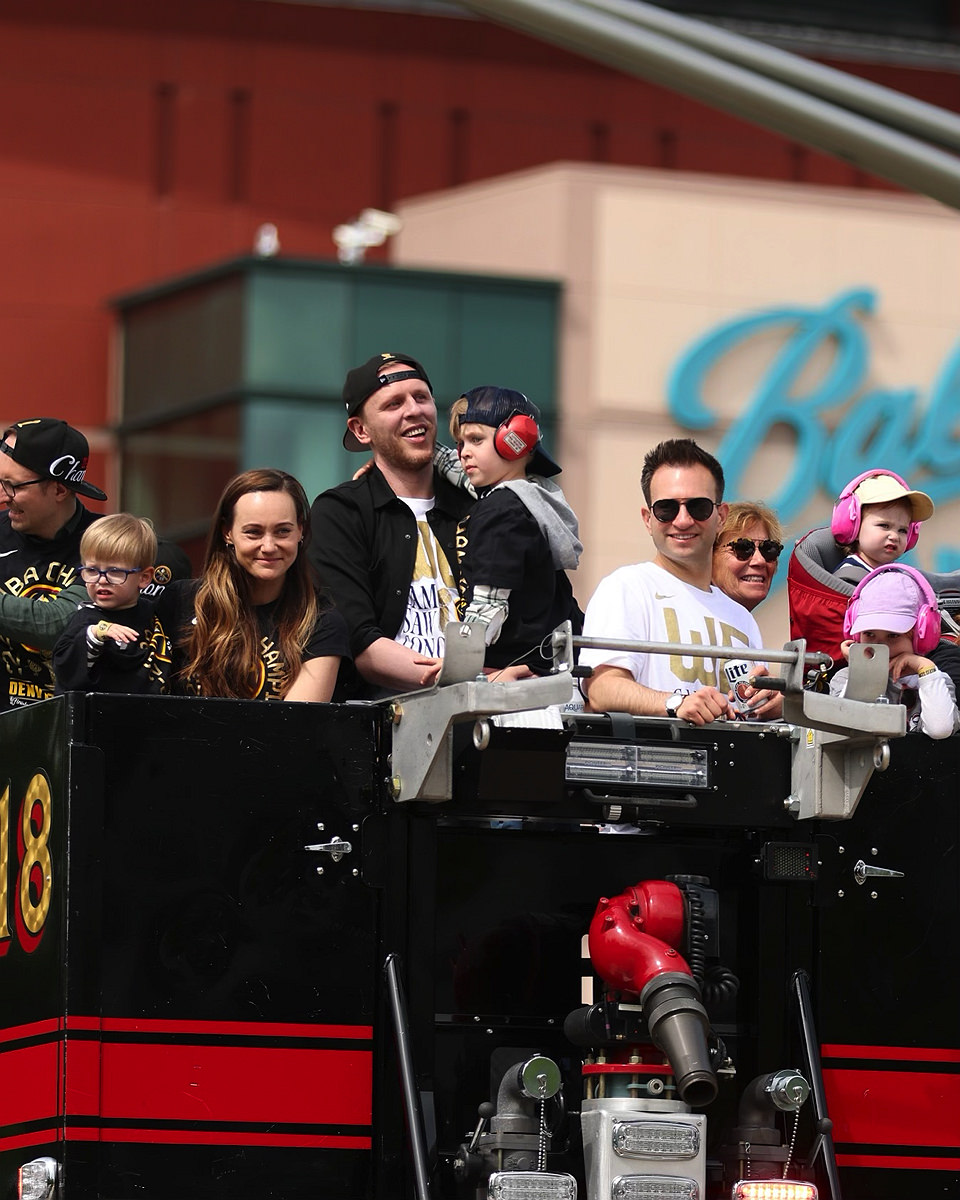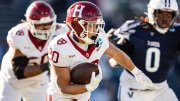For a couple of years now, the Harvard men’s basketball team and Denver Nuggets star Nikola Jokić have carried on a playful social-media exchange, ever since he kidded in a 2021 pregame radio show that he’d attended the College. (In fact, the seven-foot-tall center played professional basketball in his native Serbia before joining the NBA.) When the Nuggets won the NBA championship this June, the Crimson tweeted a message congratulating “Harvard ‘graduate’ Nikola Jokić.”
Humor notwithstanding, a real Harvard alumnus has been instrumental to the Nuggets’ success: assistant general manager Tommy Balcetis ’10. On the night Denver won the championship, Balcetis—who supports the general manager in areas ranging from data analytics to scouting to salary cap strategy—smiled broadly as he held the trophy amid the celebration. The next day, he was in the office with his colleagues preparing for the NBA draft on June 22 and the start of free agency on June 30. After that, Balcetis flew to Las Vegas, where this week the Nuggets are competing in the NBA Summer League. The frenetic pace of the past few weeks characterizes the improbable path that has taken Balcetis from Lithuania, where he grew up and first fell in love with basketball, to Harvard, where a heart condition cut short a promising playing career, to his career in the NBA.

Basketball runs in Balcetis’s family, and it’s the most popular sport in Lithuania. He remembers shooting baskets as a seven-year-old once, on a court where his father had just played an amateur game, and suddenly he found himself staring up at the gym’s owner, Šarūnas Marčiulionis, a former Lithuanian national-team star, NBA player, and future hall of fame inductee. Marčiulionis began casually guarding Balcetis and swatted his first shot. But when the boy made his next attempt, Marčiulionis suggested that he attend his basketball academy, an afterschool program aimed at turning out well-rounded students, offering classes in computers, English, ethics, and basketball training. “That is how the journey started,” Balcetis says.
In 1999, he traveled to Chicago with Marčiulionis’s academy to compete against U.S. teams and visited the United Center, home of the Chicago Bulls. In 2004, he enrolled at the Holderness School in New Hampshire, where he joined his best friend and fellow Lithuanian, Martynas Pocius, on the basketball team. The two hoped to earn athletic scholarships to an American university. Balcetis (a skilled shooter who by then had played for junior Lithuanian national teams) was recruited by several mid-level Division I programs, but in the end, he says, Harvard represented the best opportunity. He arrived on campus in 2006 and took part in the team’s preseason training, until his heart condition forced him to step away from the game. Balcetis had known previously about the problem, but grew concerned after talking with doctors about the possible effects of exerting himself on the court. “It’s kind of unfair to the team and to myself,” he realized, “if…I can’t do all the extra work to become great at it.”
Other opportunities emerged, however. Pocius, then playing at Duke, connected Balcetis with Artūras Karnišovas, another former member of the Lithuanian national team. As a player, Balcetis had modeled his game after Karnišovas, and he’d worn Karnišovas’s number 12 on his jersey as a junior player in Lithuania. Now the former star was working for the NBA basketball operations office; he helped Balcetis secure a summer internship with the league in New York. After graduating with an economics degree, Balcetis briefly joined Fidelity Investments, but in 2012 he returned to the NBA, this time in its London office, helping to manage the league’s international media distribution and broadcast rights.
Balcetis had studied Russian at Harvard, and so his boss suggested he attend an event in Moscow for Basketball Without Borders, a global basketball development and community outreach program. While there, he met Tim Connelly, then assistant general manager for the New Orleans Hornets. The two stayed in touch, and in 2013, when Connelly became the Nuggets’ general manager, he hired Balcetis as manager of analytics. The NBA’s analytics movement (using statistics and technology to track and improve player performance and team strategy) was just beginning, but Balcetis recognized an opportunity to apply the skills he’d honed at Fidelity. He learned programming and found writing code to be a “meditative experience.” It’s “something I have full control over,” he explains, “in a basketball world where so little is in your control.”
Over time, Balcetis became involved in scouting and developing trade concepts (early ideas about how to structure potential player trades). In 2020, he was promoted to assistant general manager. In that new role, analytics remains a core part of his contribution. In 2021, when Connelly (then president of basketball operations) and general manager Calvin Booth were engineering a trade for forward Aaron Gordon, Balcetis and his colleagues helped compile a statistical analysis that supported the team’s decision to make an offer. They showed that Gordon (whose sister Elise ’14 played basketball at Harvard) was one of the league’s best defenders against elite offensive players. This year’s playoffs proved the point, when Gordon was the primary defender against Los Angeles Lakers superstar LeBron James. With four seconds left in game four of the Western Conference finals and the Nuggets up 113-111, Gordon steered James toward a second defender, preventing him from getting a good shot off before the buzzer and ending the series.
Balcetis’s workmanlike approach to his job resembles that of a tough defender. Winning the NBA championship was an “unbelievable feeling,” he says, but not the fulfilment of a lifelong dream. He tries to keep his long-term goals flexible, he says, and focus instead on where short-term happiness might lead. He describes the Nugget’s organizational culture and his own attitude this way: “Let’s take care of all of these extra steps…don’t look up, keep going. And then bump your head on that trophy.”









